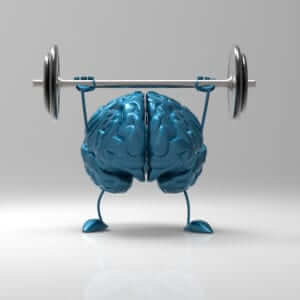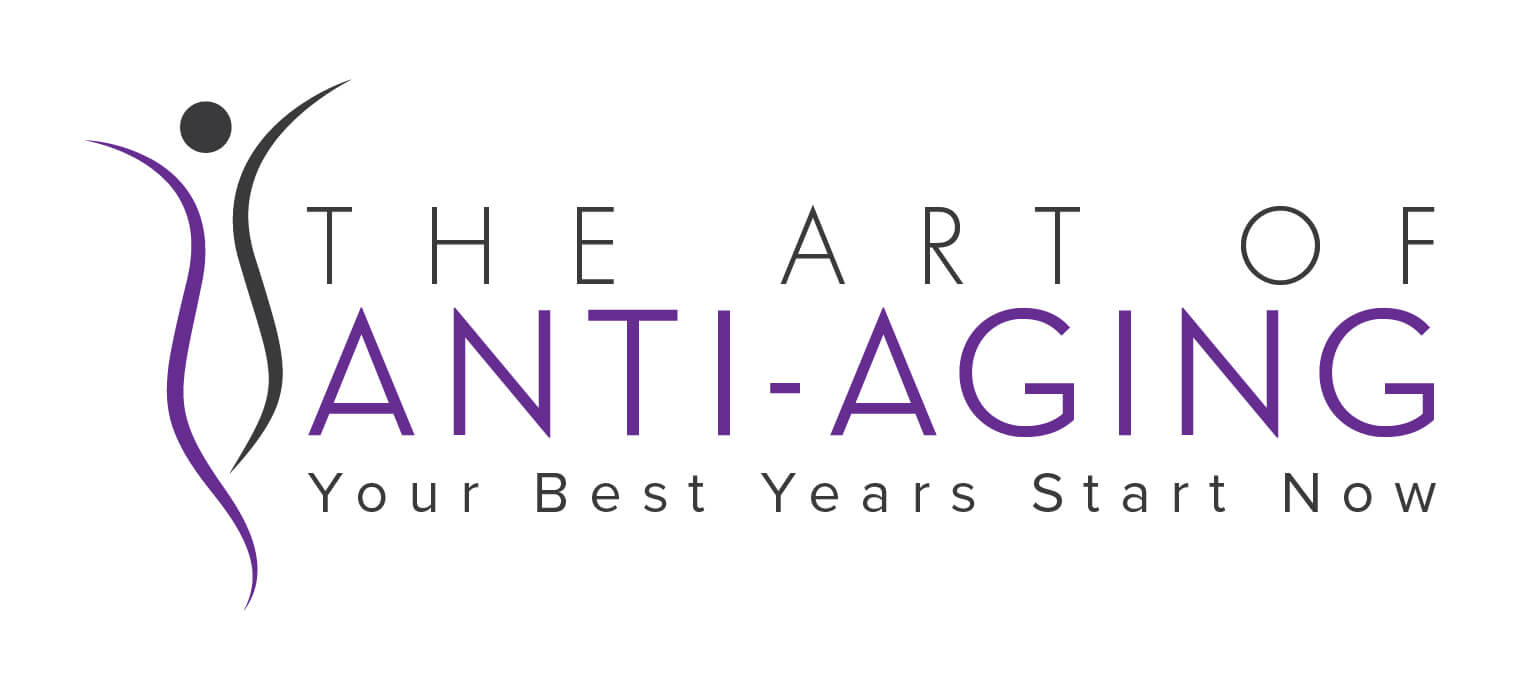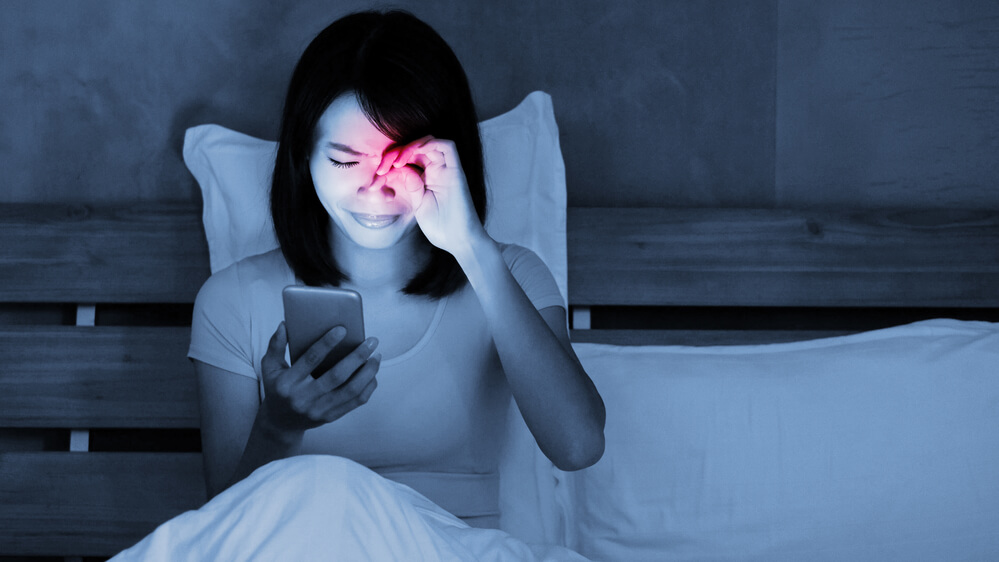Have you ever considered what effects blue light might be having on your health?
If so, you aren’t alone. This topic has gathered well-deserved attention because of the increased exposure to blue light that many people are getting daily — and the possible consequences.
Now, this isn’t a case of blue light being strictly harmful to your health. It plays an important role in keeping your body in a natural healthy rhythm. BUT the average person in our modern world is getting far more blue light than they should — and at the wrong time of day.
Here’s more on how blue light is supposed to help you and how to stop it from becoming damaging.
What Is Blue Light?
All types of light are a form of electromagnetic energy. Electromagnetic energy is essentially traveling around us all the time, and we identify different types of it based on wavelength.
Most wavelengths are invisible to the human eye. This includes ultraviolet (UV) rays, gamma rays, radio waves, infrared, and so on. Within this spectrum are specific wavelengths that we can see, which are not surprisingly referred to as visible light.
Blue light is one main color band of visible light along with green, yellow, orange, and red. When light appears white (like sunlight on a clear day) this is because it contains all the color bands.
When it comes to understanding the potential effects of blue light on your health, knowing more about wavelengths is very illuminating.
All electromagnetic energy is on a spectrum that goes from shortest wavelength to longest wavelength. The shortest ones (gamma rays) also have the highest energy and the longest ones (radio waves) have the lowest energy. The rest fall somewhere in between.
Blue light has the shortest wavelengths out of all the color bands. It falls in a range of 380-500 nanometers (nm). Even more interesting is the fact that blue light is right beside UV rays on the spectrum. UV wavelengths are just shorter and higher energy than blue light, with a range of 100-380 nm.
This could be significant because the harmful effects of too much UV exposure are well-known by now. It’s possible — though not proven — that blue light may affect us more than other colors of light because its highest-energy waves are nearly as powerful as UV rays.
Sources of Blue Light

Sunlight is the main source of blue light. This is where most of your exposure comes from as far as amount goes.
(Fun fact: The sky looks blue during the day due to the blue light in sunlight scattering off of nitrogen and oxygen particles in the atmosphere.)
The other major sources of blue light are all manmade:
- LED lights and technology
- Fluorescent lights
- Computer and laptop screens
- Smartphone screens
- Television screens
- Tablet screens
Now, the amount of blue light you get from these sources is small compared to what you get from sunlight. But for most people, this is where time of exposure really adds up. It also means you can be exposed to blue light at any time of day, which is not a good thing.
Positive Effects of Blue Light
As you can tell from its presence in sunlight, blue light is a part of natural health. When you get it in the right amount and at the right time, here are some ways it helps you.
Boosts Your Alertness
Exposure to blue light naturally boosts alertness and helps you to feel more awake. In fact, being exposed to it during the day (especially from sunlight) is important for your “biological clock”.
This inner mechanism not only helps you to feel alert, energized, and focused during the day, it also regulates other functions like hormone secretion, metabolism, and even blood pressure.
In short, the right kind of blue light exposure is needed for optimal health.
Helps Memory and Brain Function

There’s also evidence that blue light can boost your memory and overall cognitive function. This is most likely tied to its ability to improve alertness and keep your biological clock on track.
One study from 2017 even found that exposure to concentrated blue light led to better memory performance. Those who were exposed to amber light instead (the control group) did not perform as well.
Of course, given the potential problems of too much blue light, it’s better to let sunlight naturally help your mind than to try a blue light device for memory improvement.
May Improve Seasonal Depression
While exposing yourself to more blue light isn’t usually recommended, it can be helpful if you struggle with seasonal depression. Often called seasonal affective disorder (SAD), this type of depression is connected to a lack of sunlight, usually during the winter.
Light therapy has been found to be one of the most effective treatments for this type of depression for obvious reasons. The effects of blue light, in particular, are stronger than other wavelengths. It may even help with other types of depression, including bipolar disorder.
Harmful Effects of Blue Light
Disrupts Your Sleep

One of the biggest downsides of blue light is that it can contribute to serious sleep problems. It may even be one of the most common sleep disruptors in modern life.
This is mainly because exposure to blue light in the evening suppresses the release of melatonin. Melatonin is the hormone most often associated with sleep. When more of it is released in your body, you feel sleepy. When less of it is released, you feel more awake.
Sunlight has a big influence on melatonin production. In a healthy body, the appearance of the sun in the morning causes melatonin to drop, and darkness causes it to increase.
That’s why having bright lights on before you go to bed may make it harder to fall asleep when you lay down.
However, the particular color of light also makes a big difference as far as sleep is concerned. Blue light is the most disruptive, while there’s some evidence that red light might actually help you sleep better.
This makes sense if you think about it. The predominant color we see during a clear day is blue, while warmer and redder tones signal the end of the day and time to sleep (as evidenced by sunset colors).
Disrupts Your Circadian Rhythm
Your circadian rhythm is an internal process that regulates your sleep-wake cycle and other essential functions. It follows roughly a 24-hour cycle and needs to be kept “in sync” in order for you to function at an optimal level.
Much research has been conducted on circadian rhythms in humans with fascinating results. Researchers now know that they are connected to a master clock (sometimes called a circadian pacemaker) located in your brain. It’s technically known as the suprachiasmatic nucleus (SCN), which is found in your hypothalamus.
Not surprisingly, the SCN is very sensitive to light. Other factors, like exercise and temperature, can also affect it but light has the most powerful influence.
Once again, the effects of blue light on your circadian rhythm are more pronounced because your brain associates it with daylight. Being exposed to blue light in the evening or at night delays your circadian clock and can eventually completely throw off your body’s internal rhythm.
As mentioned, circadian rhythm is connected to many different functions but particularly to sleep.
Recent research indicates that exposure to blue light late in the day can have a more long-lasting impact on your sleep cycle than just melatonin suppression for a single night. It can actually shift your rhythm, causing the effects to last for days, if not longer.
The likely results? Difficulty falling asleep, poor sleep quality, waking up during the night, decreased sleep efficiency, and daytime fatigue.
Increases Your Risk of Developing Health Problems

Having your sleep cycle and circadian rhythm disrupted is a recipe for more health issues down the road.
Getting quality sleep is critical for good health. Even though it feels like you are doing nothing, your body is hard at work while you sleep. Every body system is affected by sleep (or lack of it), particularly your brain which detoxifies itself while you’re sleeping.
This is why poor sleep is connected to many health problems, from brain fog to serious conditions like diabetes, obesity, heart disease, mood disorders, and hormone-related cancers.
Also, remember that circadian rhythm is tied to much more than just your sleep-wake cycle. It’s connected to immune function, metabolism, blood sugar and cholesterol regulation, and hormone secretion- to name a few. Research has also uncovered a link between circadian rhythm and mental health.
As you can imagine, disrupting your internal rhythms will open you up to a potential health disaster. There’s even evidence that circadian rhythm disruption may increase your risk of neurodegenerative diseases.
And while you may be surprised that all of this can stem from overexposure to blue light, think of it as a chain reaction that keeps getting worse the longer it goes on.
May Affect Eye Health
Your eyes have built-in protection against certain types of electromagnetic rays. For example, the cornea and lens protect the light-sensitive retina at the back of your eyes from UV rays.
However, this is not true of blue light. Most of it makes it all the way to your retina, which is why some experts are concerned about the effects of blue light on eye health. Most of this concern centers around digital devices, which emit much less blue light than the sun but are used frequently and at close range.
At the milder end of the spectrum, blue light is a contributor to eye strain.
You’ve probably noticed it yourself, but when we stare at a screen for long periods of time, we tend to blink less and our eyes will start to feel unfocused and fatigued. Part of the reason for this is the unfocused light your eyes absorb from screens that emit blue light.
At the other end of the spectrum, there’s concern that too much blue light may cause damage to the retina. Animal studies have shown damage to retinal cells and retinal thinning after acute exposure to blue light.
There’s no evidence yet that this translates to human eyes, although there is indication that new LED devices (specifically face masks) can lead to severe eye damage.
Tips for Protecting Yourself from the Negative Effects of Blue Light

It should be clear at this point that blue light is not all harmful. In fact, when you are exposed to it in the natural form of sunlight, it’s actually helpful for your health.
However, it’s also clear that there’s a huge problem with how most modern people are exposed to blue light.
For those who work on a desktop or laptop, exposure is almost constant and happens at close range. Many people have a blue light source (or several) on right up until they fall asleep, leading to all kinds of sleep problems.
Fortunately, there are some targeted ways you can reduce blue light exposure (and you don’t even have to give up technology).
Avoid Electronic Devices Before Bedtime
Most experts agree that stopping electronic use 2-3 hours before bedtime is best for your circadian rhythm. Now, there are some other options if you absolutely can’t give up a certain device in the evening hours, but this is the top way to protect your sleep cycle.
Use a Blue Light Filter
More and more electronic devices are coming equipped with apps that filter out blue light. If you don’t want to give up screens at night, at least start switching one of these filters on in the 2-3 hours before you go to sleep. Most of them use warmer shades of light to switch your device to “night mode”.
Don’t Forget the Light Bulbs
It’s important to remember that fluorescent and LED lights also emit blue light. We don’t stare into them like we do a phone screen, but having them on late at night can still affect your sleep. If you can, dim the lights a few hours before bedtime. Or try using red lights for night lights and lamps, which are less likely to disrupt circadian rhythm.
Cut Down on (Man-Made) Blue Light During the Day
If you work a lot on a computer during the day, cutting down on the blue light from your screen may help your eyes. One option is to wear glasses that filter out blue light. You can also find blue light blocking screen filters that fit over your laptop or desktop screen.
Get More Sunshine During the Day
Getting blue light from its natural source — the sun — is beneficial for your circadian rhythm and sleep cycle. Your body is meant to be energized by the right kind of blue light in the daytime, so don’t keep yourself inside all day long!
Sleep Better With Less Blue Light
Taking steps to prevent the negative effects of blue light will only help your health, particularly when it comes to sleep.
Ideally, you want to establish a nighttime routine where you’re getting only low levels of blue light at the most. Remember, it will take some time for your circadian rhythm to get back in sync, so keep your efforts consistent. To boost the effect, consider adding in foods that help with sleep.
By being intentional about blue light, you can get all of its good side with minimal amounts of its damaging side!



Thank you … Very informative. Useful to read the positive and negative effects of blue light. The tips are simple and quite practical.
With gratitude!
Thank you. I have a melatonin problem, and so have cut down my screen time.
this was very helpful!!! Thanks for all the wonderful information you share with all of us whether middle aged or older who need to know things to help navigate this very interesting time of life!! Also the times I’ve heard your speakers mention the Lord is so very very helpful as well!!! I don’t know where I’d be as I age without Him and a great support group of other Believers!!! Sheryl
Very insightful! I knew of the effects, but this article covers all aspects of the pros and the cons.
THANK YOU
How do I forward article about the Effects of Blue Light
Brian,
Do you have any suggestions on where to get good glasses that block blue light?
Thanks in advance.
Hi Candy,
Try Claire’s or Staples.
Hope that helps.
Previously made suggestions were SAFETY BLUE and TRUEDARK, using the red lenses and face molding frames to assure total blue light blocking during evening and nighttime use, and the yellow lenses to block blue light from screens during the day. Hope this helps those who missed this information in webinar .
Great article. I knew a lot about blue light. It was presented beautifully. I good reason to avoid bue sun glases.
In gratitude, Kathy
Thank you for the great info. Am I to understand that a bedroom night clock that indicates the time in blue lit numbers is the very thing you are talking about ???
A very scholarly, well-researched article. It will definitely help me to take necessary corrective steps.
MANY THANKS for sharing your knowledge with us.
You covered the subject very well.
I hope to find one of the “blue light filter screens” for my iPad and computer screen.
Do you have any suggestions where to look for
them? Thank you. Jan
Thank you , I am now well informed about the good and bad effects of Blue Light !
Wonderful info!!! no wonder my sleep is disruptive. Thank you so much. Suzanne
BRILLIANT ! … as always ! Totally agree with all the above comments ++ it is great to read the advice and information in such clear ‘easy to understand language’ . Of course, Dad Jokes add their huge healing power ! Thank you !
Thank you for this helpful information.
Very good info. I got a blue light screen for my computer last year and its a big help. Also no electronics in the bedroom is most helpful. Always good advice and a good chuckle every time. Thank you.
Thank you for this informative information, now I understand as to why I have trouble sleeping. I will get blue light filters for my computer (desktop), plus will get blue light glasses for when watching tele. What you have shared is of great benefit to all of humankind, I hope there are people who take note to try to help themselves. Very much appreciated, for I have to get my eyes checked, as they say I have signs of eye damage (glaucoma and cataracts). I tend to think it is being on the computer far too long all day every day. Thanks ever so much for I now realize that in the past years have on the computer for far too long. This is a blessing in disguise. Maria.
A great article. However, I hope in follow-up articles about blue light you will inform people that there are apps that can be downloaded that will automatically regulate the color emitting from the screen. On my laptop I use the f.lux app (and it’s free). It automatically changes the screen tone to a more orange tone at sunset. Plus for the daytime hours, I have set it to add a bit of orange to the usual blue light, so I am never looking at 100% blue light, ever. I regularly use my laptop up to an hour before bed. I have no eye strain (unless I’ve been sitting at my laptop way too many hours that day), and I have no problem falling asleep.
Another source of blue light that can damage your eyes, try driving at night for hours looking at those powerful LED headlights, some of which are distinctly BLUE. Almost like accidentally looking at the sun during the daytime.
I heard several states are passing laws banning them. They should, a study on mice in France resulted in retinal damaged blind mice.
Yes…Light has amazing effects on life…LED sourced UV light causes plants to grow plush and green in our Agriculture Science Lab…we added a heavy dose of infraRED and they started blooming.
Thank You for a very informative article.
My concern is blind people. I know a diabetic type 1 blind man. How does it work for him ? Does he activate the SCN in an other way ?
Do you have any thoughts about that ?
Truly appreciate this nicely balanced assessment of blue light in our lives and how to get the best advantages and avoid the worst effects.
Thanks! This is the most inclusive and helpful article that I’ve read on blue light. The sun info. was fascinating. This phone doesn’t have a “blue light filter”, but it does have “dark mode”. That makes the text white on a grey-black background, and leaves the pictures in normal colors. The brightness feature works normally,.
My eyes and body have felt a big sense of relief since making this change. Best regards.
Very enlightening (pun intended)! I appreciate the time and effort taken to write such an in-depth article. Thank you!
Very interesting article. Thank you for researching this.
I mostly skimmed the above article on Blue Light. For you see, I am totally blind. Even though I have light perception, (which allows me to tell when the sun is out or not and when it’s either totally light or dark in a room). So, as you can see, Blue Light doesn’t really affect me as a blind person. Right?